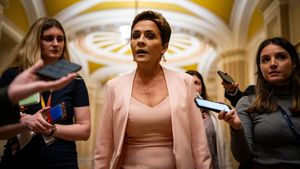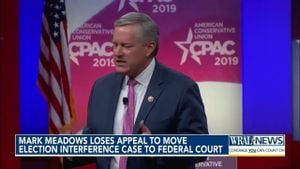Elon Musk and Vivek Ramaswamy have taken the lead on the newly established “Department of Government Efficiency” (DOGE) under President-elect Donald Trump. This ambitious initiative aims to revamp federal agencies and significantly reduce government costs. The DOGE aspires to cut down expenses by as much as $2 trillion within the next two years, targeting inefficiencies buried within the layers of bureaucracy. Musk and Ramaswamy, both known for their bold ideas, have sparked interest and intrigue with plans they characterize as potentially revolutionary.
Yet, experts are sounding cautionary notes about the viability of this grand endeavor. The DOGE is primarily positioned as an advisory body, meaning it may face considerable hurdles as it attempts to implement its ambitious plans. According to Douglas Holtz-Eakin, president of the American Action Forum, significant constraints lie within the structure of the federal government itself. He noted, "There’s the executive branch [that] might be in their way. The Congress might be in their way. The Constitution is a bit of an obstacle.” Those are some weighty roadblocks right from the start.
This past Tuesday, Trump officially introduced Musk and Ramaswamy as the dual heads of the DOGE. He expressed hopes for sweeping reforms to how government spends taxpayer dollars, indicating the panel would provide substantial guidance and advice directly to the White House and the Office of Management and Budget (OMB). "It will become, potentially, 'The Manhattan Project' of our time," Trump stated, heightening expectations surrounding this new government entity.
Initial communication from DOGE has already taken place through the creation of its official account on the social media platform X, where it pledged to work around the clock to maximize the efficiency of taxpayer spending. While the intentions of DOGE are clear, the actual impact of its plans remains uncertain.
Experts remain skeptical, questioning the real authority the DOGE will have to enact change. Holtz-Eakin remarked, “It just seems to me they’re going to be out there trying to suggest things without having any power to make those things happen.” Essentially, the panel's role may boil down to offering recommendations rather than imposing changes.
Navigations through bureaucratic chains often require congressional approval, and much of the efficacy of proposed budget reforms hinges on cooperation from Capitol Hill. Darrell West, senior fellow at the Brookings Institution, echoed this skepticism, stating, “But since this was not created by Congress, we don’t know what its authority is and what status it has.” If DOGE lacks the backing of the legislative body, its suggestions may be treated just like anyone else's — with varying degrees of seriousness, depending on the political climate of the moment.
Despite the lack of legislative foundation, analysts like West point out the potential influence due to Musk’s close relationship with the incoming president. “Musk has the ear of the president, so people have to take it seriously just for the reason,” he noted, emphasizing how connections at the top level may lend some credibility to DOGE’s endeavors. After all, having the backing of such high-level relationships can sometimes work wonders, especially within the complex web of politics.
The ambition to execute reforms across diverse federal agencies is what sets DOGE apart from many previous efficiency initiatives. Trump’s administration has touted similar efforts, but the combination of Musk's tech-savvy innovation and Ramaswamy’s business acumen might truly be worth watching. Understanding the dynamics at play here is not just about individual capacity; it involves the interplay between various government branches and their willingness to entertain new ideas.
Trump has historically captivated audiences with promises of efficiency and cost-cutting, and much of Ramaswamy's appeal stems from his brand of political disruption mixed with genuine entrepreneurial spirit. Supporters are undoubtedly hopeful—if anyone can attempt to mix government duty with innovative ambition, it’s these two characters. Yet these plans also draw scrutiny and are met with both hope and apprehension about the future of government functionality.
Beyond funding cuts, those crafted proposals must also take practical execution strategies and real-life outcomes on board. Without clarity on how reforms will translate from the drawing board to actionable programs, the skeptic's view can seem very reasonable. A vision can only take flight if accompanied by concrete steps paving the way forward.
Meanwhile, DOGE has the ambition to make sweeping changes beyond mere fiscal adjustments. It aims to reconsider structural elements of the U.S. government, which oftentimes become unwieldy and stale. There's no denying the necessity for fresh perspectives on systemic efficiency. Many insiders have long argued for upgrades to the aging bureaucratic model, and DOGE positions itself to provide those insights, even if currently constrained.
Opponents of the plan argue change efforts can feel more like idealistic fluff if devoid of substantial power or authority. Critics view Musk’s plans, coupled with Ramaswamy’s business strategies, as fanciful dreams potentially disconnected from the legislative realities of Washington. Holtz-Eakin expressed views reminiscent of this line, pointing out: “They’re not going to be able to take over the agencies. Nothing is stopping people from doing the right things every day if they want to.”
Further compliciating matters, any significant budgetary cuts must navigate not only political hesitations but also the emotional tug among citizens who depend on various government services. Historical sentiments from previous administrations highlight the pushback systemic changes could elicit as various groups rally to defend programs facing cuts.
Still, both Musk and Ramaswamy show signs of heavy commitment and enthusiasm toward their mission. There’s palpable excitement surrounding the DOGE, and how it can potentially alter the course of federal efficiency practices. It carves out space for discussions around how innovation and technology intersect with governance, which can open up new avenues for exploration around efficiency.
With the upcoming legislative sessions on the horizon, both public and private sectors will be watching closely to see how Musk and Ramaswamy translate their ambitions onto the federal stage. There has been buzz surrounding competing ideas, and as public discussions continue, the road ahead for the DOGE will be revealed and shaped by myriad influences throughout the machinery of government.



